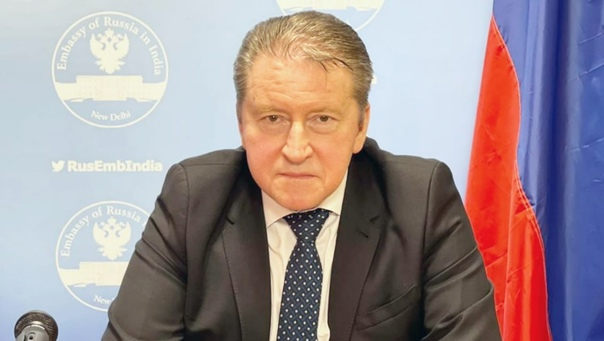NEW DELHI: Russia on Monday supported India’s vision for the Indo-Pacific but at the same time criticised the Quadrilateral coalition or Quad, saying it would be detrimental to inclusive dialogue for ensuring peace and stability in the region.
Russian Ambassador Nikolay Kudashev, replying to a question at a media briefing on China’s growing belligerence in the Indo-Pacific, said Moscow would welcome enhanced dialogue between New Delhi and Beijing and even wished that relations between the two sides reach the level of Indo-Russia ties.
“We (India and Russia) are special privileged and trusted strategic partners. I do really dream and I really wish your relationship with China reaches the same level. In our capacity as a friend to both India and China, we will welcome enhanced dialogue between Beijing and New Delhi,” he said.
“We believe that this is the key to future progress of your ties with the People’s Republic of China and for regional stability and security,” he said.
Kudashev’s comments came nearly two weeks after Russian Foreign Minister Sergey Lavrov accused the Western powers of pursuing an “aggressive and devious” policy to engage New Delhi in “anti-China games” by promoting Indo-Pacific strategies.
The Russian envoy said Moscow does not have any problem with Prime Minister Narendra Modi’s Indo-Pacific Ocean’s Initiative (IPOI) while Deputy Chief of the Russian mission Roman Babushkin said his country supports Indian vision for the region.
At the East Asia Summit in Bangkok last year, Modi proposed setting up of the IPOI to conserve and sustainably use the maritime domain and to make meaningful efforts to create a safe and secure maritime domain.
“We are facing some attempts by some countries to create containment and alienation in the Indo-Pacific region which could threaten and jeopardise basic principles for regional cooperation, for example ASEAN centrality and ASEAN unity…Quad would be detrimental to the inclusive dialogue in the region,” Babushkin said.
The 10-nation Association of Southeast Asian Nations (ASEAN) is a major stakeholder in the Indo-Pacific region.
The Quad, comprising the US, India, Japan and Australia, is aimed at ensuring a free, open and inclusive Indo-Pacific. China has increasingly considered the Quad as a mechanism to contain it in the maritime domain.
Kudashev said Russia was offering a “unifying agenda” for the Indo-Pacific that could bring together the Russian vision, the Chinese vision and the Indian vision for the region.
“Unlike this approach (Quad), Russia calls for a broad regional dialogue and unified agenda based on equality and respect for all countries for inclusive and undivided regional security,” Babushkin said in the joint briefing.
He said Russia was looking forward to continuing consultations with India on the issue, noting that his country is the “most sincere well wisher” of India in its growing regional and global profile.
In his comments, Kudashev also referred to recent visits of Defence Minister Rajnath Singh and External Affairs Minister S Jaishankar to Moscow, adding they had “profound negotiations” with their Chinese counterparts there.
“It was very significant in the context of constructive engagement of both sides to maintain peace and tranquillity at the Line of Actual Control,” he said.
Singh and Jaishankar visited Moscow in September to attend separate meetings of the Shanghai Cooperation Organisation (SCO) during which they held meetings with their Chinese counterparts on the eastern Ladakh border standoff.
“Russia is a trusted partner for India and China, and we feel it is vital to ensure a positive atmosphere for cooperation between the two neighbouring Asian giants, including at the platforms of the SCO, BRICS (Brazil-Russia-India-China and South Africa) and RIC (Russia-India-China),” he said.
The envoy described Indo-Russia defence cooperation as “unparalleled” noting that it is based on real exchange of technologies and joint ventures that help India to advance local production and expand its military export potential.
“We are working on co-development and co-production of equipment, components and spare parts, improving after-sales service system and deepening localisation programmes,” he said.
On bilateral trade ties, Kudashev said there was an ever-expanding scope of interregional cooperation and referred to the vast potential of the Far Eastern region of Russia.
“Together we work to extend the use of national currencies in trade, to ensure an early conclusion of the India Eurasian Economic Union FTA and reach USD 30 bn in mutual trade by 2025,” the envoy said.
“Such areas as alternative payment systems and information security would certainly support expanding economic partnership. More opportunities will be open with the re-establishment of the direct Vladivostok-Chennai sea route,” he added. (AGENCY)
Trending Now
E-Paper


